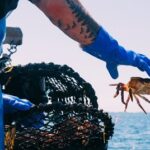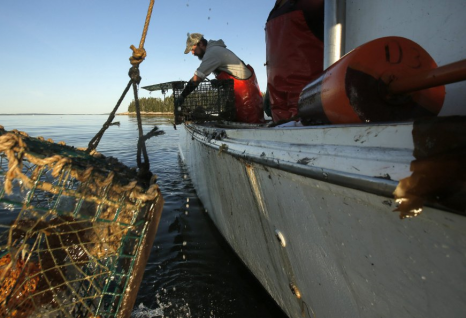Ocean Resource Privatization
Articles Posted by Date
The New England groundfish debacle (Part III): who or what is at fault? Nils E. Stolpe/FishNet
NILS STOLPE: The New England groundfish debacle (Part IV): Is cutting back harvest really the answer?
While it’s a fact that’s hardly ever acknowledged, the assumption in fisheries management is that if the population of a stock of fish isn’t at some arbitrary level, it’s because of too much fishing. Hence the term “overfished.” Hence the mandated knee jerk reaction of the fisheries managers to not enough fish; cut back on fishing. What of other factors? They don’t count. It’s all about fishing, because fishing is all that the managers can control; it’s their Maslow’s Hammer. When it comes to the oceans it seems as if it’s about all that the industry connected mega-foundations that support the anti-fishing ENGOs with hundreds of millions of dollars a year in “donations” are interested in controlling. Read the article here
-
Recent Posts
-
The Cape Cod Fisherman – About time…
It’s been 19 yrs since the NMFS/ASMFC said striped bass were restored and the moratorium on a directed fishery was lifted here in MA. Since then Read More » -
Atlantic States Marine Fisheries Commission may/will shut down Maine shrimp AGAIN!
A technical committee that advises federal regulators strongly recommends extending a moratorium that began in 2014. A draft of the committee’s report says “long-term trends in Read More » -
Sea scallops close to ‘sustainable’ MSC label ? Big ENGO deal. NOT!
NEW BEDFORD — An international environmental group is a step away from declaring the Atlantic scallop fishery as “sustainable,” properly managed and in no immediate danger Read More » -
AESA Urges U.S. Government to Reject ESA Listing for American Eel
Following a petition from the Council for Endangered Species Act Reliability (CESAR) (click here to see petition), the U.S. government this month will once again consider Read More » -

Naches fishing captain buys time with his family by spending his summers in Alaska
Imagine being 36 years old and having spent every single summer of those 36 years fishing in Alaska. Every. Single. Summer. This is Joe Rosenkranz’s way Read More » -

Todays Roundup of East Coast Marine Monument Entries. The list will grow.
It is a very sad day for the New England fishing industry following the Presidents announcement that he pretty much made fishery management irrelevant when he Read More » -

Coast Guard, local agencies responding to boat fire near Santa Cruz Island, 33 people aboard the vessel are unaccounted for.
SAN PEDRO, Calif – Coast Guard and partner agencies are responding to a vessel fire near Santa Cruz Island Monday. At approximately 3:15 a.m., Coast Guard Read More » -

New England’s Cod Quota Drops Again! The Problem Could Be a R/V Bigelow Trawl Issue
To whom this may concern. The Northeast Trawl Advisory Panel has been working on the overspreading issue and their solution is to put a restrictor rope Read More » -
Lobster season in eastern Cape Breton launches today
Setting day for about 540 fishermen was supposed to be Saturday, but because a lot of fishermen weren’t ready, it was decided to set a few Read More » -
ALASKA DEPARTMENT OF FISH AND GAME DIVISION of COMMERCIAL FISHERIES. NEWS RELEASE
2013 Southern Southeast Inside Subdistrict Sablefish Fishery News Release here Read More » -

L’Ecume II: specialist teams leave Jersey as recovery operation comes to an end
Harbourmaster Bill Sadler has been notified by the States police that there are no further tasks for the teams to complete at the wreck site, after Read More » -

“Oiled: A Fisherman’s Journey”
Derrell Short, a former fisherman, has released his memoir, covering everything from the Exxon Valdez oil spill to his adventures at sea in Kodiak Island, Alaska. Read More » -

3 crab fishermen survive harrowing capsize off Oregon coast
Three men were in good condition early Wednesday after being cut from inside the hull of a capsized crab boat off the Oregon coast. Their harrowing Read More » -

Pacific Seafood Controls the Dungeness Crab Market, but Small Fishermen Are Fighting Back
After a blockbuster 2022 crabbing season that saw an on-time, December 1 start date and record prices for fishermen, this year’s crab season didn’t kick off Read More » -
Western Pacific Regional Fishery Management Council Recommend Reducing 2017 Catch Limits for Three Species
HONOLULU (21 June 2017) The Western Pacific Regional Fishery Management Council today concluded the second of its three-day meeting in Honolulu with a recommendation that the Read More » -

Fuel Man John G. Liarikos, II of Dartmouth, Mass, has passed away
John G. Liarikos, II, 69, of Dartmouth passed away suddenly on Monday September 18, 2023. Born in New Bedford, the son of the late Jeannine (Loranger) Read More » -
C-NLOPB investigating 6,000-litre spill, how it was measured
The province’s offshore regulator wants some clarification on how the Hibernia consortium measures the size of oil spills. The decision comes in the wake of a Read More » -

Norm Peters, the bearded skipper of North Rustico, dies
One of Prince Edward Island’s best known fishermen has died. Norm Peters, known as the bearded skipper, fished lobster out of North Rustico, and ran tours Read More » -

State, federal officials vow to take quick action on Federal Fishery Disaster Declaration for salmon fishing industry
State and federal officials are vowing to move quickly to secure disaster aid for Californians affected by the closure of this year’s commercial and recreational salmon Read More » -
South Atlantic Red snapper season vote upcoming
The long push to reopen red snapper fishing off the Southeastern coast comes to a head Monday when the South Atlantic Fishery Management Council will vote Read More » -
Species groups follow patterns reacting to climate change on US northeast shelf
Researchers studying marine fishery species grouped by similar depth and temperature distribution have found that those groups have similar responses to the effects of climate change. Read More » -
‘Wicked Tuna’ Exclusive Clip: It’s A New Day & Everyone’s Looking For The First Catch
“Wicked Tuna’s” fifth season will pick up with some captains still struggling after the rough winter season captured in spinoff series “Wicked Tuna: Outer Banks.” This season, newcomer Read More » -
Loss of beloved fisherman still felt two years on
Tyrone Sock often thinks of his father when he looks at his son. Grief is a strange combination of what has happened and what won’t. Craig Read More » -
Athearn Marine Agency Boat of the Week: 62′ Turnkey Fiberglass Dragger, Cat 3408
To review specifications, information, with 25 photos’,>click here< To see all the boats in this series, >click here<. 06:24 Read More » -
Six Terrebonne oystermen arrested
Six Terrebonne Parish oystermen were arrested late last week for taking oysters during a closed season, according to the Louisiana Department of Wildlife and Fisheries Enforcement Read More »
-
Archives
- April 2025 (117)
- March 2025 (176)
- February 2025 (156)
- January 2025 (172)
- December 2024 (157)
- November 2024 (161)
- October 2024 (170)
- September 2024 (180)
- August 2024 (178)
- July 2024 (171)
- June 2024 (172)
- May 2024 (191)
- April 2024 (191)
- March 2024 (209)
- February 2024 (192)
- January 2024 (211)
- December 2023 (187)
- November 2023 (201)
- October 2023 (180)
- September 2023 (101)
- August 2023 (240)
- July 2023 (237)
- June 2023 (211)
- May 2023 (231)
- April 2023 (209)
- March 2023 (215)
- February 2023 (179)
- January 2023 (187)
- December 2022 (177)
- November 2022 (187)
- October 2022 (190)
- September 2022 (175)
- August 2022 (203)
- July 2022 (186)
- June 2022 (184)
- May 2022 (186)
- April 2022 (190)
- March 2022 (216)
- February 2022 (166)
- January 2022 (191)
- December 2021 (190)
- November 2021 (182)
- October 2021 (196)
- September 2021 (197)
- August 2021 (203)
- July 2021 (220)
- June 2021 (211)
- May 2021 (220)
- April 2021 (204)
- March 2021 (201)
- February 2021 (187)
- January 2021 (194)
- December 2020 (191)
- November 2020 (181)
- October 2020 (204)
- September 2020 (194)
- August 2020 (189)
- July 2020 (204)
- June 2020 (193)
- May 2020 (224)
- April 2020 (218)
- March 2020 (215)
- February 2020 (209)
- January 2020 (232)
- December 2019 (226)
- November 2019 (240)
- October 2019 (241)
- September 2019 (240)
- August 2019 (270)
- July 2019 (287)
- June 2019 (270)
- May 2019 (263)
- April 2019 (223)
- March 2019 (210)
- February 2019 (155)
- January 2019 (117)
- December 2018 (216)
- November 2018 (167)
- October 2018 (217)
- September 2018 (247)
- August 2018 (258)
- July 2018 (258)
- June 2018 (249)
- May 2018 (251)
- April 2018 (244)
- March 2018 (266)
- February 2018 (254)
- January 2018 (278)
- December 2017 (308)
- November 2017 (280)
- October 2017 (288)
- September 2017 (274)
- August 2017 (284)
- July 2017 (287)
- June 2017 (272)
- May 2017 (275)
- April 2017 (274)
- March 2017 (299)
- February 2017 (252)
- January 2017 (288)
- December 2016 (262)
- November 2016 (267)
- October 2016 (284)
- September 2016 (284)
- August 2016 (292)
- July 2016 (285)
- June 2016 (272)
- May 2016 (244)
- April 2016 (267)
- March 2016 (260)
- February 2016 (265)
- January 2016 (267)
- December 2015 (265)
- November 2015 (279)
- October 2015 (288)
- September 2015 (286)
- August 2015 (298)
- July 2015 (294)
- June 2015 (327)
- May 2015 (315)
- April 2015 (317)
- March 2015 (323)
- February 2015 (300)
- January 2015 (332)
- December 2014 (321)
- November 2014 (330)
- October 2014 (381)
- September 2014 (340)
- August 2014 (347)
- July 2014 (375)
- June 2014 (401)
- May 2014 (344)
- April 2014 (341)
- March 2014 (375)
- February 2014 (374)
- January 2014 (360)
- December 2013 (294)
- November 2013 (372)
- October 2013 (391)
- September 2013 (461)
- August 2013 (566)
- July 2013 (526)
- June 2013 (447)
- May 2013 (475)
- April 2013 (508)
- March 2013 (459)
- February 2013 (352)
- January 2013 (265)
- December 2012 (206)
- November 2012 (168)
- October 2012 (187)
- September 2012 (126)
- August 2012 (4)
Tags
Alaska Alaska Department of Fish and Game Athearn Marine Agency Atlantic States Marine Fisheries Commission Boat of the Week BOEM Brexit British Columbia California canada Coast Guard commercial fisherman commercial fishermen commercial fishing Coronavirus Department of Fisheries and Oceans DFO Dungeness crab FFAW Gulf of Maine lobster Louisiana maine Maine Department of Marine Resources massachusetts National Marine Fisheries Service new-england-fishery-management-council Newfoundland and Labrador New Jersey NMFS NOAA North Atlantic right whale North Carolina. North Carolina Fisheries Association North Pacific Fishery Management Council Nova Scotia Obituary offshore wind offshore wind farm offshore wind farms Oregon Scotland U.S. Coast Guard United Kingdom weekly update
Comments
- Scott bayer on ‘Hope dies hard’: Fishing industry reacts to CA salmon season closure
- lost coast on THANK YOU, THANK YOU, THANK YOU, PRESIDENT TRUMP – By Jim Lovgren
- Roy diehl on THANK YOU, THANK YOU, THANK YOU, PRESIDENT TRUMP – By Jim Lovgren
- Kirk larson on THANK YOU, THANK YOU, THANK YOU, PRESIDENT TRUMP – By Jim Lovgren
- Brick Wenzel on THANK YOU, THANK YOU, THANK YOU, PRESIDENT TRUMP – By Jim Lovgren
- Muddog on THANK YOU, THANK YOU, THANK YOU, PRESIDENT TRUMP – By Jim Lovgren
- Stephen Melz on “A MAN IS ONLY AS GOOD AS HIS WORD” By Jim Lovgren
- Robert Schrader on “A MAN IS ONLY AS GOOD AS HIS WORD” By Jim Lovgren
- Kathleen Davidson on Thousands celebrate local shrimp industry in McIntosh County
- Buddy Whitten on Thousands celebrate local shrimp industry in McIntosh County
- Charles F Tekula jr on “A MAN IS ONLY AS GOOD AS HIS WORD” By Jim Lovgren
- james R Lovgren on “A MAN IS ONLY AS GOOD AS HIS WORD” By Jim Lovgren
- Mike Jacobs on “A MAN IS ONLY AS GOOD AS HIS WORD” By Jim Lovgren
- Jaynerenee McGuire on Massachusetts lobsterman says he’s under attack, rattling Cape Cod community: ‘Dictatorship!’
- Rob on For some N.S. fishers, grievances with Liberals outweigh U.S. tariff worries
- Steve on First Nations convoy targeting N.S. elver rivers to protest DFO as lawlessness returns to fishery
- Al Francis on First Nations convoy targeting N.S. elver rivers to protest DFO as lawlessness returns to fishery
- Michael Wade on All Sides Struggling to Find Common Ground for Potential Compensation Package
- borehead - Moderator on RI Delegation Introduces Bill to Secure Fair Representation on Catch Quota Decisions
- Joel Hovanesian on RI Delegation Introduces Bill to Secure Fair Representation on Catch Quota Decisions
- Nena LeBlanc on Save Our Shrimpers Act reintroduced to prevent taxpayer dollars from being used to fund foreign shrimp
- Philip Midkiff on NCFA WEEKLY UPDATE for March 17, 2025
- Kelly Taska on Amid ‘shrimp fraud’ reports, Tampa Bay area shrimpers need support
- Chuck Tekula on Fishermen could face stricter catch limits as Trump slashes NOAA
- Colleen Speer on Trump’s Offshore Wind Review to Consider Status of Projects
- Tracy Barrois on Higgins, Nehls Introduce the Save the Shrimpers Act
- B Keane on Mass Layoffs at Companies Working on Humboldt Offshore Wind Projects; At Least Some Local People Laid Off
- borehead - Moderator on Commercial fisherman sentenced to 6 months in prison for falsifying fishing records and taking an endangered sperm whale
- james R Lovgren on Trump firings hit NOAA scientists, analysts on South Coast
- Frank Haggerty on Trump firings hit NOAA scientists, analysts on South Coast
-
Facebook





































Fish Regulators & Mangers must CHANGE their WAYS AS OUR OCEANS ARE CHANGING !!